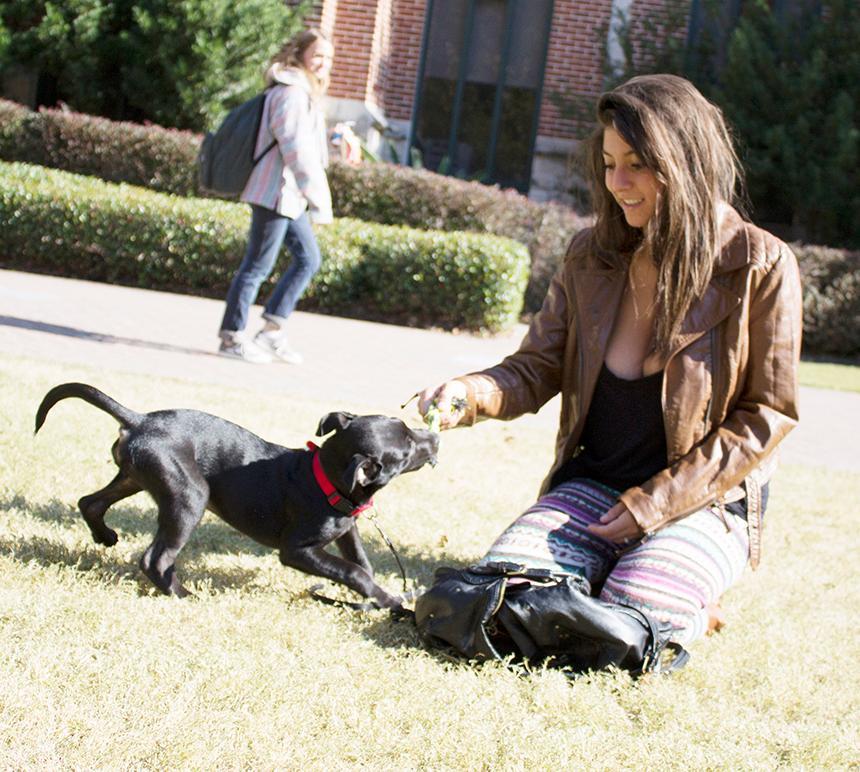Jake Lacy’s family couldn’t stand watching the dog next door being chained up during the hottest days of the year, so they decided to adopt him. “I think it’s terrible to treat animals poorly like that,” Lacy, business marketing junior, said. Now, a newly proposed ordinance could make that sort of treatment illegal and increase protections of domestic animals.
The ordinance, which was proposed by District “A” Councilmember Susan Guidry and the Louisiana SPCA, involves changes to existing laws, which have not been completely revised in 15 years.
One part of the ordinance says that cats and dogs cannot be kept outside during extreme weather conditions.
Under the current laws, cats and dogs must be brought inside during freezing temperatures. It is being expanded to include any extreme weather advisory issued by the NOAA’s National Weather Service.
“If there are high temperatures, you can’t just leave the dog outside. We see a lot of dehydration and even death,” said a City Council staffer.
Up until now, the laws have been vague concerning other extreme weather situations like hurricanes and tropical storms.
“We don’t have language regarding hurricanes or natural disasters and how to care for
your companion animals in those situations. We’re trying to strengthen the language to protect and promote humane ethics,” said Jennifer Abbrecht, communications director for the LA/SPCA.
The laws would also revise how a dog can be tethered outdoors to make it more humane. The tether must allow the dog to move at least 30 feet, or the dog must be removed from the tether twice a day for 60 minutes so that it can move around and socialize. The tether also cannot inhibit the dog’s access to shelter, shade, food and water.
According to the LASPCA, chained dogs are 2.8 percent more likely to bite people and are statistically more dangerous than a pack of free roaming dogs. In 1997, the USDA deemed chaining as a primary source of confinement “inhumane” and disallowed it.
This law will help put Louisiana on code with the rest of the country according to Abbrecht. Six states have outlawed tethering entirely and several other states have laws similar to those proposed by the city council.
Feral cat colonies are also included in the proposed laws. Cats that have been spayed or neutered, ear tipped and properly vaccinated against rabies should be allowed outside as long as they don’t disrupt the neighborhood.
Feral cat colonies can be beneficial to neighborhoods in terms of pest control, according to Abbrecht. It is more cost effective and humane for the state to manage feral cats through spaying and neutering than it is for them to be moved out of their natural habitat.
“We have a very widespread homeless animal population here. There is definitely a need for more spay and neuter services to be introduced at all levels of the community. I think getting people to really understand and embrace those services is really key,” Abbrecht said.
Other parts of the ordinance include changing the rabies shot requirement from once a year to once every three years and adding a “potentially dangerous dog” category that requires owners to take additional precautions when a dog chases someone without biting them.
If the laws are passed, the LA/ SPCA will have a campaign to update residents on how laws will be changing and how they will be enforced.
“We will have a bit of a grace period for people to get used to it and to try and educate the community on the new laws,” Abbrecht said.
Pets and pet owners alike will benefit from this ordinance said Lacy. “Animals should be taken care of more and abused less; that should be our goal.”
Mary Jameson can be reached at mdjameso@loyno.edu








